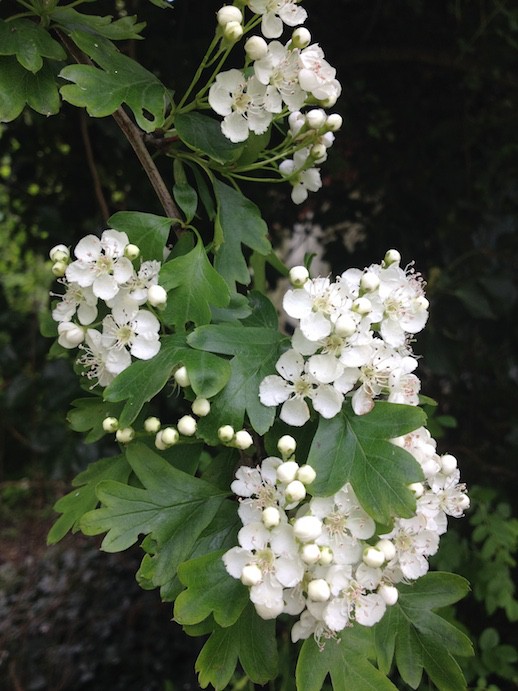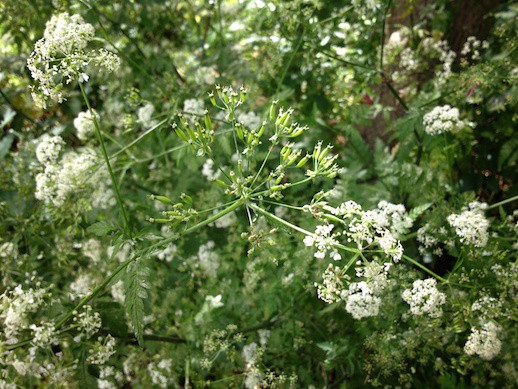Words and pictures: Melissa Harrison
They say happiness writes white, which (apart from the election) made May a very joyful month. It rioted along the country’s hedges, swagging them in hawthorn blossom; it dressed the city parks and verges in banks of foaming cow parsley. Ramsons raised their stink in shady places, while beside the motorways crowds of newly opened ox-eye daisies nodded to the rushing cars.
On Tooting Common where I walk my dog, white feathers on the path led to a long-tailed tit’s teardrop-shaped nest of lichen and cobwebs, empty now and torn. Something had found it and dragged it from a thicket, taking the tiny chicks and spilling its lining of pale pigeon down. Not far away, the bones of a big dog-fox in a bramble thicket gleamed white through its dull pelt; whiter, though, were its bared teeth, tartar on the big carnassial molars telling its age. It sits on my bookshelf now, bleached and very beautiful. The skull, I mean. Not the fox.
The sky was high and white over the Hay Festival when I arrived, a little nervous, at 8.30am on bank holiday Monday. The first slot of the day, and yet the room was full: blessed are they who attend literary events, and even more blessed are they who buy a book afterwards. After signing copies of At Hawthorn Time and Clay I escaped and we drove to the Black Mountains for a walk with our dog, Scout. The streams were white scribbles down the hillsides, skylarks sang and sheep studded the high ground, white against rust. We never did get back to the festival.
I was done in, anyway: I had nothing left. We’d driven to Hay-on-Wye straight from my father’s 83rd birthday lunch, a gathering of a large, fractured family some of whom I hadn’t seen in 30 years. A child again, I escaped to the bottom of the garden where a grass snake cut smoothly through the duckweed on a pond I helped dig in 1987. Gold-green frogs blinked warily from the margins, as they have always done; above and behind everything, the high, white screams of swifts.
Dad enjoyed the day, despite not being sure who everyone was; he continues to fight dementia hard, and I am very proud of him. “He’s amazing,” says the lady from the care company, and tells me she’s never seen the condition progress so slowly. Always an intelligent, capable man, he’s good at hiding his uncertainty – but more than that, he works at it, looking for clues, piecing things together, reading the world. He was always curious about everything around him and brought me up to be the same; despite his efforts, though, sometimes his expression is a cursor blinking on a blank screen. I think of the ex who told me, many years ago, that I took life like a battle – in contrast (I suppose) to his superior, easygoing approach. If he meant that I have the energy, like my Dad, to ask questions of everything, and to grapple with the world, I’m more than happy with that.
Three times in May I went in search of nightingales, and still I’m not sure if I have heard one. People who write about nature are commonly thought to be experts, to always know hawk from handsaw; it does not do to admit uncertainty. Sod that; I am only an enthusiast – and there’s no shame in being self-taught. So there it is: I went, by myself, after work, to a site with at least sixteen pairs of nightingales and listened to the entire, glorious dusk chorus, from cacophony to total silence, and I don’t know if I heard one sing. I went back twice more, and still I can’t say for sure.
I heard a hundred birds I recognised: blackbirds, whitethroats, blackcaps, chaffinches, song thrushes, chiffchaffs, willow warblers, robins, wrens, dunnocks, a tawny owl. I walked beneath a heronry, their huge nests stark against a white moon, white splattering the path below, and was startled by their prehistoric craaaks; I was sonically investigated by bats, and barked at by deer. I heard beautiful birdsong I couldn’t place, but because I don’t yet know the songs of every bird it might have been, I couldn’t say for sure. Yes, of course I’ve listened to nightingale recordings. A thousand of them (please don’t send me more). But let me tell you: standing there in a darkening scrub, two dozen birds belting out competing songs from every compass point, the M25 a distant hum, with nobody to help you unscramble what you hear is nothing, nothing, like those clean, clear soundwaves on the screen.
I guess I won’t know for sure, now; with the end of May comes the end of the window in which nightingales sing. The question of whether I’ve heard one, I’ll have to accept, is unresolved; my curiosity unsated: nature isn’t like Google, or on-demand TV. But fucking hell, I had a magical time on those three evenings. Perhaps it’s good to not always get what you want.
Happiness writes white, so what does it mean that I’ve started writing again? I don’t know what it will be yet, which is important: it makes me curious to find out. Writing is not concerned with happiness; in fact, I find it painful – but then, not writing is painful too. I can’t win, so I just put one foot in front of the other, walking carefully, listening closely, into the dark.
The pleasures of May are over. It’s June: the nightingales have fallen silent; the hawthorn blossom and the banks of cow parsley are over for another year. Instead, on the white page now, the patient cursor blinks.
Copies of At Hawthorn Time and its audio companion, Rivertones 3, are both available in the Caught By The River shop

